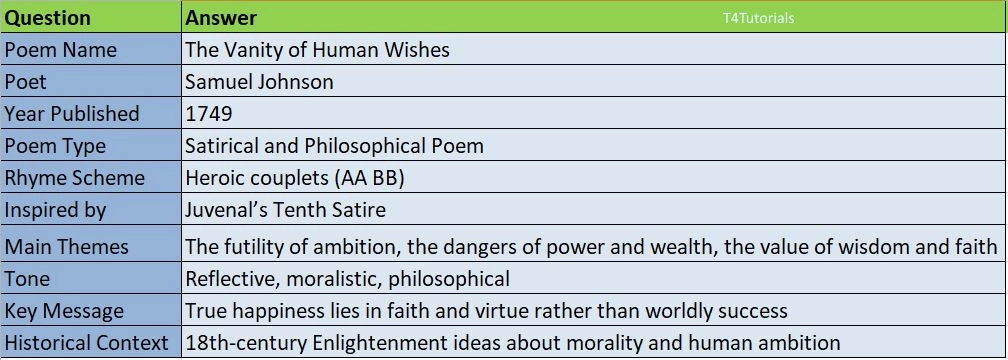Summary:
Samuel Johnson’s The Vanity of Human Wishes is a satirical and philosophical poem that critiques the futility of human ambitions. Inspired by Juvenal’s Tenth Satire, the poem explores how mankind’s relentless pursuit of power, wealth, knowledge, and pleasure often leads to disappointment, suffering, or downfall. Johnson examines historical and contemporary figures, demonstrating how their aspirations resulted in misfortune rather than fulfillment. He emphasizes that material success is fleeting and warns against trusting in human desires, which are often misguided. The poem ultimately advises readers to seek wisdom, humility, and faith in divine providence, as true happiness lies in spiritual contentment rather than worldly achievements. Johnson conveys his message through heroic couplets, reinforcing his moralistic and reflective tone.
10
Score: 0
Attempted: 0/10
Subscribe
| Question | Answer |
| Poem Name | The Vanity of Human Wishes |
| Poet | Samuel Johnson |
| Year Published | 1749 |
| Poem Type | Satirical and Philosophical Poem |
| Rhyme Scheme | Heroic couplets (AA BB) |
| Inspired by | Juvenal’s Tenth Satire |
| Main Themes | The futility of ambition, the dangers of power and wealth, the value of wisdom and faith |
| Tone | Reflective, moralistic, philosophical |
| Key Message | True happiness lies in faith and virtue rather than worldly success |
| Historical Context | 18th-century Enlightenment ideas about morality and human ambition |